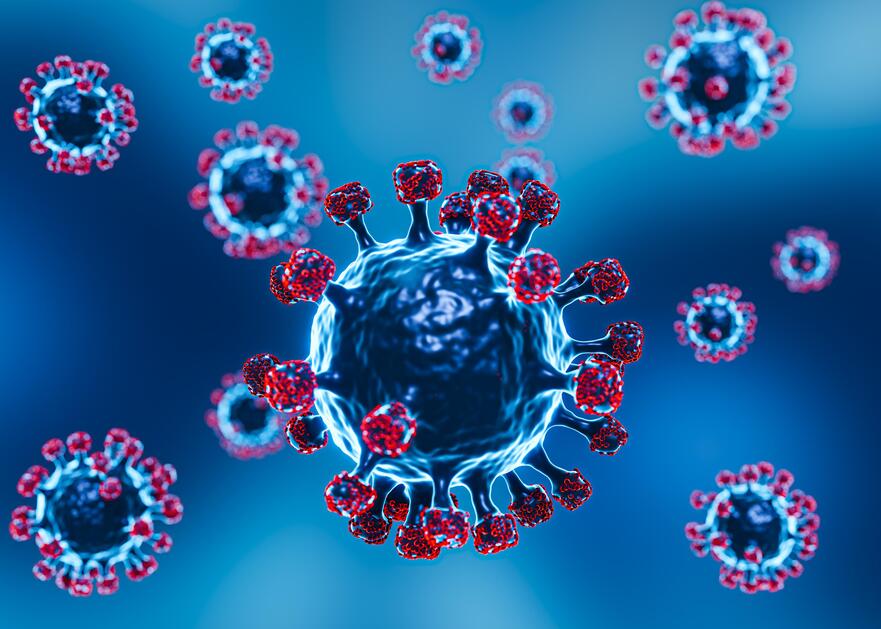

New research from UC Davis Health has some good news about COVID-19 and kidney health. Even though many people in the hospital with COVID-19 face kidney issues, like acute kidney injury (AKI) and other problems, this study found that the virus is not strongly associated with the long-term loss of kidney health of those affected by COVID-19. So, it seems like COVID-19 might not have a big impact on long-term kidney health.
“Early in the COVID-19 pandemic, kidney abnormalities were often recognized in patients with COVID-19,” said Hiba A.M. Hamdan, the principal investigator of the study and health sciences assistant clinical professor in the Division of Nephrology. “Given how infectious COVID-19 was and the large numbers of individuals being hospitalized with the virus, it was imperative we better understand the short and longer-term kidney sequelae of COVID-19 infection so we could prepare if we saw a significant uptick in the incidence of chronic kidney disease.”
In the pandemic’s initial year, research revealed that more than 25% of COVID-19 hospital patients faced AKI, a sudden kidney issue. Acute kidney failure, or acute renal failure, is swift kidney damage occurring within hours or days. Some reports noted continued long-term kidney function issues post-COVID-19 despite relatively short follow-up periods.
“Given how infectious COVID-19 was and the large numbers of individuals being hospitalized with the virus, it was imperative we better understand the short and longer-term kidney sequelae of COVID-19 infection so we could prepare if we saw a significant uptick in the incidence of chronic kidney disease at all stages.”Hiba A.M. Hamdan
In investigating potential long-term kidney issues in hospitalized COVID-19 patients, researchers analyzed electronic health records from adults in the University of California (UC) Health System, encompassing six medical centers. They looked at:
- Individuals who underwent PCR testing and tested positive for SARS-CoV-2 between March 1, 2020, and Dec. 31, 2021.
- Patients hospitalized within 10 days of testing.
- Patients hospitalized for at least one day.
- Individuals not diagnosed with end-stage renal disease.
- Non-pregnant patients.
The AKI inpatient cohort comprised 5,451 COVID-19 individuals, averaging 59 years in age, with 59% being male and 45% Hispanic. The rate of COVID-19 patients experiencing AKI fluctuated between 20-38% throughout the reviewed period.
Researchers assessed long-term kidney function in the cohort by examining estimated glomerular filtration rate (eGFR) trajectories. This involved individuals with COVID-19 and a distinct group with AKI (acute kidney failure) but without COVID-19. The study followed patients until Dec. 31, 2022, and found no significant difference in eGFR loss between the two groups during the roughly two-year follow-up period.
Likewise, a sizable cohort studying the enduring impacts of COVID-19 on kidney function found comparable results. This pertained to patients who did not experience a hospitalization event within 10 days after the initial SARS-CoV-2 PCR testing.
“This study has important implications because we examined a very diverse cohort from one of the largest healthcare systems in California and had one of the longest reported follow-up periods of kidney function following COVID-19 infection,” explained Hamdan. “Our hope is that these findings help guide our healthcare system and others in planning for post-COVID-19 care.” This also has implications for other respiratory viruses and how they can impact kidney function.
Source: UCDavis Health
more recommended stories
 Is Prediabetes Reversible through Exercise?
Is Prediabetes Reversible through Exercise?150 Minutes of Weekly Exercise May.
 New Blood Cancer Model Unveils Drug Resistance
New Blood Cancer Model Unveils Drug ResistanceNew Lab Model Reveals Gene Mutation.
 Healthy Habits Slash Diverticulitis Risk in Half: Clinical Insights
Healthy Habits Slash Diverticulitis Risk in Half: Clinical InsightsHealthy Habits Slash Diverticulitis Risk in.
 Caffeine and SIDS: A New Prevention Theory
Caffeine and SIDS: A New Prevention TheoryFor the first time in decades,.
 Microbial Metabolites Reveal Health Insights
Microbial Metabolites Reveal Health InsightsThe human body is not just.
 Reelin and Cocaine Addiction: A Breakthrough Study
Reelin and Cocaine Addiction: A Breakthrough StudyA groundbreaking study from the University.
 Preeclampsia and Stroke Risk: Long-Term Effects
Preeclampsia and Stroke Risk: Long-Term EffectsPreeclampsia (PE) – a hypertensive disorder.
 Statins and Depression: No Added Benefit
Statins and Depression: No Added BenefitWhat Are Statins Used For? Statins.
 Azithromycin Resistance Rises After Mass Treatment
Azithromycin Resistance Rises After Mass TreatmentMass drug administration (MDA) of azithromycin.
 Generative AI in Health Campaigns: A Game-Changer
Generative AI in Health Campaigns: A Game-ChangerMass media campaigns have long been.

Leave a Comment